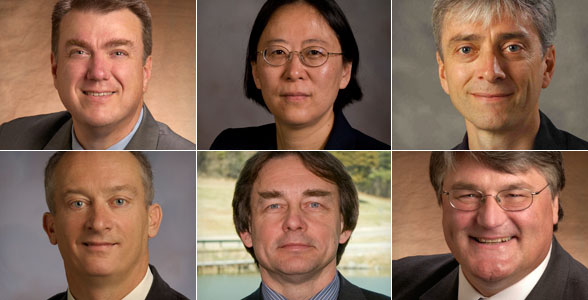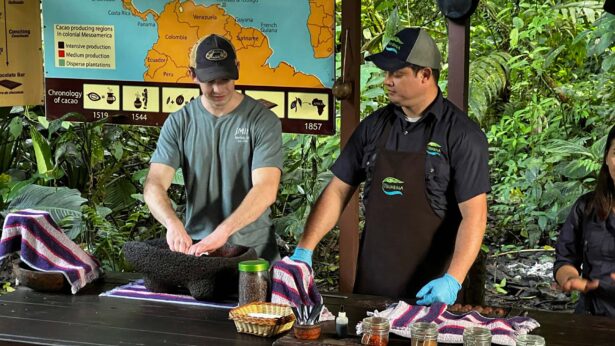By Jay Mayfield
In a year marked by major changes at the University of Tennessee, the change that could leave the most lasting impression is the giant leap forward taken by the UT–Oak Ridge National Laboratory Governor’s Chair program in adding five new members to its ranks.
Put in place in 2006, the program is designed to attract the best scientists and researchers in the world to unique joint appointments at UT and ORNL. Governor’s Chairs receive substantial funding to conduct their research, and the program is supported by money from UT–Battelle LLC, which manages ORNL, and the state of Tennessee.
The strongest draw for the new faculty members is not, however, the funding but the unequaled access. The chairs have access to the state-of-the-art facilities available at ORNL and on the UT Knoxville campus, as well as to colleagues and staff members at both institutions who represent a major concentration of advanced knowledge.
Now that they are here, these top-notch researchers are already making their presence known around campus and at the laboratory with work that has the potential to change the way we light our homes, drive our cars, and care for our health for decades to come. The five chairs added in 2009 represent an array of scientific disciplines.
Jeremy Smith
Jeremy Smith, the Governor’s Chair for Neutron Science, was the first appointment to the program, hired in 2007 from Germany’s highly regarded University of Heidelberg. Smith has already had a major impact in his short time as a Governor’s Chair. Working with researchers from both institutions, he has used the neutron scattering and computational resources available at ORNL to good effect in projects that include new approaches to bioremediation and to the understanding of protein folding, an important issue in medicine.
Alexei Sokolov
Alexei Sokolov, the Governor’s Chair for Polymer Science, came to UT Knoxville and ORNL from the University of Akron. He is a leading innovator in the creation of new materials for use in a variety of applications. By building and manipulating these new materials, sometimes atom by atom, Sokolov is able to create customized molecules that are useful in such areas as fuel-cell technology and other alternative energy applications.
Howard Hall
Howard Hall, the Governor’s Chair for Global Nuclear Security, came to UT Knoxville and ORNL from Pacific Northwest National Laboratory. He is an established global expert and researcher in nuclear security issues. He focuses on the best ways to control the worldwide spread of nuclear materials, how to prevent nuclear attacks like those using a “dirty bomb,” and how to respond should such an attack occur. Besides his research appointment in the College of Engineering, he also is affiliated with the Howard H. Baker Jr. Center for Public Policy at UT Knoxville.
Yilu Liu
ilu Liu, the Governor’s Chair for Power Electronics, came to UT Knoxville and ORNL from Virginia Tech University. She is the world’s leading expert on new “smart grid” technologies. As the nation moves toward more sustainable sources of energy, we face a major challenge in how to get that energy from where it’s produced to where it’s used. Liu is developing new ways to control and manage the nation’s power grid to ensure a steady stream of energy to power our homes and businesses.
Thomas Zawodzinski
Thomas Zawodzinski, the Governor’s Chair for Electrical Energy Storage, came to UT Knoxville and ORNL from Case Western Reserve University. He is an expert and innovator in fuel cell and energy storage technology. His work centers on the effort to make fuel cells and batteries more durable, efficient, and better able to function in wider temperature ranges, with the goal of making the technology an increasingly viable option in our nation’s energy portfolio.
Frank Loeffler
Frank Loeffler, the Governor’s Chair for Microbiology and Civil and Environmental Engineering, came to UT Knoxville and ORNL from Georgia Tech. He is a leading expert on novel approaches to bioremediation, using naturally occurring bacteria to break down human-caused pollution in ecosystems. Loeffler also studies new kinds of bacteria in an effort to develop innovative technologies for applications ranging from environmental protection to medical treatments.



